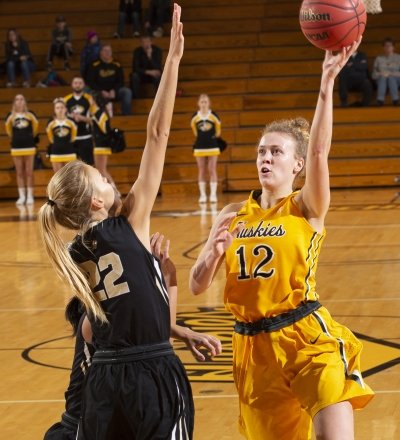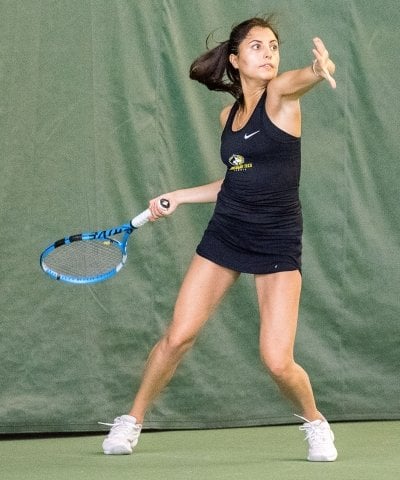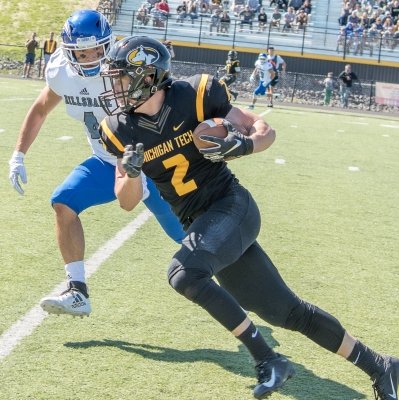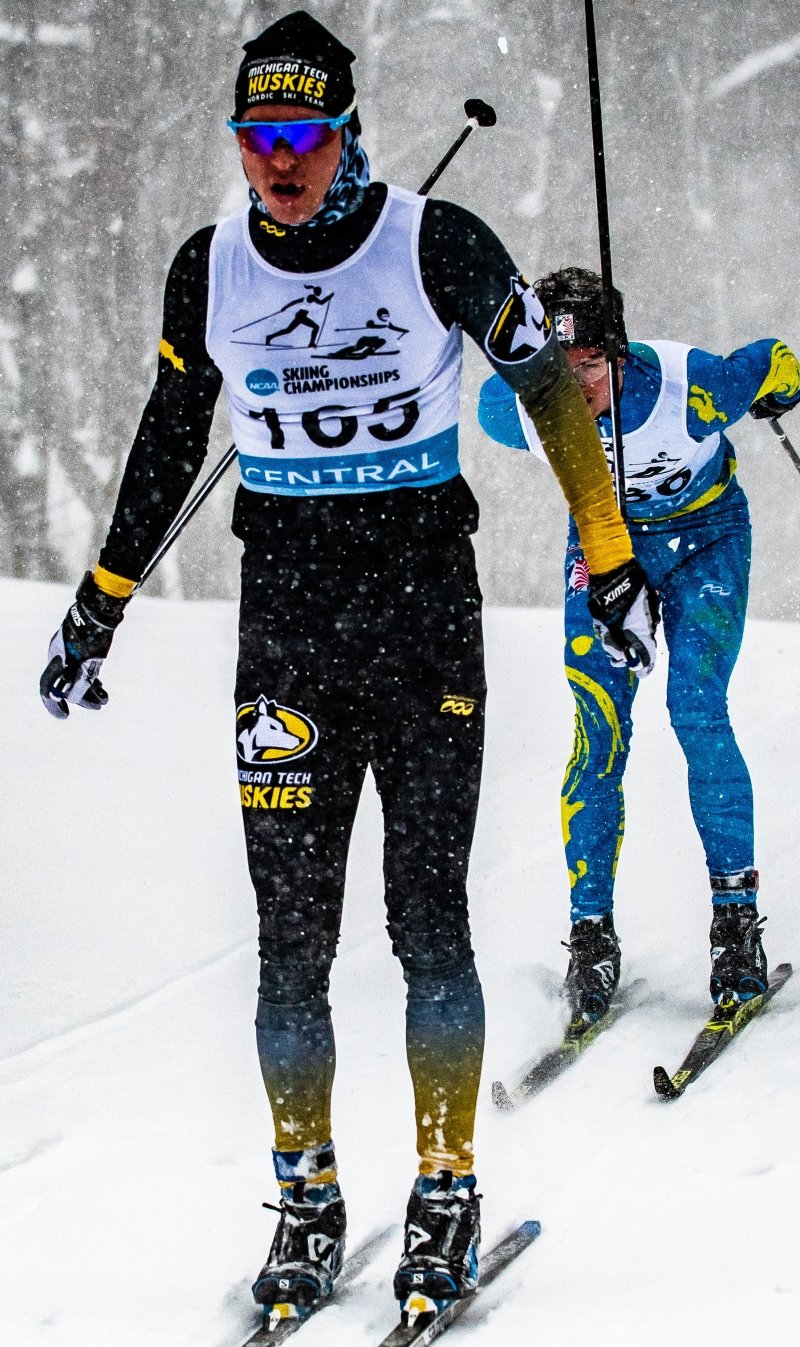They’re more than athletes and students—they’re both.
The term “student-athlete” is not a squished hyphen, a juxtaposition, a default by proximity; it’s a deliberate collaboration between coaches, faculty, prospective students, and current students. What makes Michigan Tech Athletics different is the University’s culture as a whole: This is a great place for both mental and physical might, and the University focuses on preparing student-athletes for their futures. Every school says it; we do it.
What Gets You Out of Bed in the Mornings?
- Lizzie Bloch: Can I say coffee?
- Vicky Quinde: Making my family proud.
- Gaspard Cuenot: First thing I do is open the window and see how the weather is.
- Jacob Wenzlick: Coffee. And I get up and go.
Student-athletes often wake up tired like the rest of us, but the most successful ones—like the Huskies in this story—have discovered a few of life’s secrets during their time at Michigan Tech. They have learned that the “balance” our culture obsesses over in work, life, hobbies, joys, and trials is not found by building a static and carefully constructed fulcrum, but by practicing a dynamic mindset every day. Starting with the motivation to get out of bed.
Abbie Botz plays for the Michigan Tech Women’s Basketball team and is majoring in exercise science. She says motivation comes from making her family, team, and community proud and that she gets through the day-to-day grind by planning ahead.
“Put your headphones in and focus. You get good at doing that anywhere,” Botz says. “In my freshman year, I was really sleep-deprived and that affected my ability both on the court and in the classroom, so I’ve learned to prioritize going to bed earlier, and I’ve noticed that I’m more successful and attentive if I wake up a bit earlier, so I work on my homework then.”
Her coach, Sam Hoyt, says being a mentor means helping students build those individualized habits and demonstrating that a student-athlete represents the University at all times: “It means saying no to a lot of things in order to prioritize your sport, your grades, and your family. Your grades and your athletic performance reflect your program.”
And this isn’t bluster. According to stats provided by American universities, the national average GPA at public universities sits around 3.1 and GPAs for student-athletes have tended to be lower. But the Michigan Tech Women’s Basketball team upholds a 3.7 GPA, the highest across all divisions in the NCAA, and earned several Great Lakes Intercollegiate Athletic Conference (GLIAC) honors this past academic year, including Botz, who was named First Team All-GLIAC. It’s not just basketball players slam-dunking academics. Overall, the 370 student-athletes on 14 competitive teams all keep a GPA above 3.0—averaging a 3.4—and many students receive academic honors, including the 139 on the 2018 Dean’s List.
How do they do it?
How Do You Handle Class and Studying?
- Abbie Botz: It's a learned skill.
- Laura De Marchi: Google calendar.
- Tyler Rockwell: I have this planner here, which is my whole life.
- Lizzie Bloch: Attitude and schedule.
Most student-athletes have morning classes followed by afternoon practice. They make sure to schedule time to eat, work out, study, and rest. Many travel on the weekends during season—though some sports travel less, it can be up to 10 trips for hockey and 17 trips for basketball that can run Wednesday to Sunday.
Rhys Edwards is here to help. As the director of NCAA compliance and student-athlete services, he teaches a fall course called Student-Athlete 101 and he sees every single incoming student, 110 of them in the 2018 class, who participates in Michigan Tech sports. Edwards tutors them on study techniques—good habits form from practice, not talent—and offers advice to navigate classes, majors, travel, life.
Coaches and staff recruit student-athletes who are prepared for the rigor of a Michigan Tech education and athletic experience. It’s a partnership: Athletics provides the facilities, quality coaching, tutoring, mental health support, and leadership training so the student-athlete can be successful; recruits commit to be the best they can as both students and athletes. Top-notch learning happens at the edge of comfort zones, so the expectations are high, but realistic, and fully supported.
“We break the stigma—if someone needs help, we want them to come to us, we want our students to succeed,” Edwards says. “Taking care of their mental well-being and physical well-being makes them all-around student-athletes.”
Being both a student and an athlete is what brought Gaspard Cuenot to campus. A former skier for the national Swiss team, Cuenot is a senior majoring in marketing who is willing to brave sub-zero temps for winter Nordic ski races around the region.
“There is the same intensity in the classroom as there is on the trail. I know what my goals are and I don’t waste time,” he says. “I know there is no shortcut, so I get to work and do my best.”
What Keeps You Going During a Hard Day?
- Jacob Wenzlick: A ton of water.
- Lizzie Bloch: One task at a time.
- Tyler Rockwell: Sauna after practice.
Student-athletes seem to smile and laugh and joke as much as any other student, but there is an intensity about them. They’re the personification of Michigan Tech values.
“Taking shortcuts is not an option at Michigan Tech. It is not enough to be prepared for athletic competition; it is just as important to be prepared for the academic rigors of the classroom, and it takes a well-rounded and focused person to do that,” says Dan Mettlach, associate head football coach. “Mental toughness for a student-athlete at Michigan Tech is crucial, because the challenges you face go well beyond the field.”
Football player Jacob Wenzlick says that teamwork carries over from time spent on the field.
“Being around other players who have the same challenges in school helps,” says Wenzlick, a mechanical engineering major in his junior year. “When you see other people studying, then it’s easier for you to go do your homework, too.”
Another part of the intensity is counter-intuitive: Performing well takes deliberate rest. Several student-athletes spoke of their first-year tendencies towards perfection and how they’ve learned to focus in on what really matters to them.
“Taking time for yourself helps you keep your concentration and keeps you happy because it’s easy to get lost and frustrated,” says volleyball player Laura De Marchi, a biomedical engineering major. “Many people focus on how their body is doing, but we also need to check in on how our minds are doing, too.”
Afternoon naps, cooking, stretching every night for 50 minutes, taking a phone call from Dad every Saturday morning in the hotel lobby while traveling between games. Everyone has their own way to retreat and recharge. And they’re hard-earned lessons.
“Everyone will struggle,” says cross-country and track runner Liz Bloch, a graduate student in biomedical engineering. “You’re not going to come in and have everything go perfectly, just understanding the important things to get done matters. In the end, it’s all important, but the focus of my education is being a student and being healthy.”
What Do You Eat?
- Vicky Quinde: Plain oatmeal for breakfast. Protein, rice, and vegetables for lunch.
- Jacob Wenzlick: I should probably eat more vegetables.
- Lizzie Bloch: All the vegetables. I hate it but it's true.
Good food and rest are essential to student-athlete performance. And being both a student and an athlete are key ingredients in the recipe for success.
“I know I’m stressed, I have so much to do—but if I don’t go to practice or work out, then I can’t focus. I really need the exercise,” says tennis player Vicky Quinde, a senior studying mechanical engineering with a minor in aerospace and another minor in economics; next year, she will be an assistant coach. She adds that external motivation is a good pressure that also helps her focus: “You commit.”
Commitment is about finding complementary practices. Kristen Monahan, assistant coach with the Nordic ski teams, explains that “more is not always better in regards to training,” she says. “Being a student-athlete requires you to truly be all-in in every aspect of life, every single day; time management, health, sleep, recovery, performance. Being a student-athlete is not easy but is an incredibly rewarding opportunity and an honor.”
-
370student athletes
-
3.4student athlete cumulative GPA
-
139student athletes on the Dean's List
-
14all 14 teams had a team GPA above a 3.0
Loading. . .
Loading. . .
Loading. . .
At the End of the Day, What's Special About Being Here?
- Vicky Quinde: My teammates come from around the world; here, we feel like family.
- Abbie Botz: Seeing that people really do care.
- Tyler Rockwell: Professors work with us.
- Gaspard Cuenot: We work well as a team to do well as individuals.
Student-athletes themselves are incredible individuals, but on their own they couldn’t thrive and flourish. As much as they personally need sleep, veggies, tailored workouts, and a winning mindset, their collective success grows from the culture established at Michigan Tech by faculty, coaches, fellow students, and the local community.
At the heart of student-athletes’ motivation is the importance of their futures. They decided to play for Michigan Tech as much for the academic drive as the athletic. Tyler Rockwell, a second-year studying finance who plays on the Michigan Tech Hockey team, explains why student-athletes are willing to be both.
“It’s what we love. You can be good at something if you don’t like doing it, but you’re never going to be great at it if you don’t love it,” Rockwell says. “That gets you out of bed for a 7 am workout; it keeps you awake at night to study; it keeps you going after a seven-day road trip when you’re both physically and mentally tired. It keeps you going.”
Professors are a big help in that regard. They proctor exams at odd hours, post lessons online, encourage tutoring, and don’t skimp on feedback, grading, edits, and challenges for their students who also happen to be athletes. Student-athletes here are expected to be competitive in the classroom and smart in the game—and they know it because they’re thinking long-term about their careers, well-being, and happiness.
“As long as there is this passion burning inside you, you can make the magic happen,” Nordic skier Cuenot says. “At the end of the day, if you’re able to find a job that motivates you, then you won’t look at your weekly horrors, you’ll do it because you like it.”

Lizzie Bloch
- Major
Biomedical Engineering. - Favorite Workout
Trail runs! - What does it mean to be a student-athlete?
Resilience. - Dream Job
Clinical Engineering.

Tyler Rockwell
- Major
Finance + Minor in Economics. - Favorite Workout
Anything but prowlers. On a serious note: Pull-ups. - What does it mean to be a student-athlete?
Dedication. - Dream Job
Venture Capitalist.

Laura De Marchi
- Major
Biomedical Engineering + Minor in German. - Favorite Workout
I really enjoy any workout that involves a volleyball. - What does it mean to be a student-athlete?
Commitment. - Dream Job
Building prosthetic devices for paralympic athletes.

Abbie Botz
- Major
Exercise Science + Minor in Psychology. Pursuing Master’s in Kinesiology. - Favorite Workout
Circuit with prowlers. - What does it mean to be a student-athlete?
Privilege. - Dream Job
Physician Assistant.

Gaspard Cuenot
- Major
Marketing - Favorite Workout
Speed training at the Tech Trails. - What does it mean to be a student-athlete?
Opportunities. - Dream Job
Entrepreneur in sustainable solutions.

Jacob Wenzlick
- Major
Mechanical Engineering. - Favorite Workout
Back squats. - What does it mean to be a student-athlete?
Commitment. - Dream Job
Working at Milwaukee Tool.

Vicky Quinde
- Major
Mechanical Engineering + Minor in Aerospace Engineering + Minor in Economics. - Favorite Workout
Running, preferably at the beach. - What does it mean to be a student-athlete?
Honor. - Dream Job
Writer.
Michigan Technological University is an R1 public research university founded in 1885 in Houghton, and is home to nearly 7,500 students from more than 60 countries around the world. Consistently ranked among the best universities in the country for return on investment, Michigan's flagship technological university offers more than 120 undergraduate and graduate degree programs in science and technology, engineering, computing, forestry, business, health professions, humanities, mathematics, social sciences, and the arts. The rural campus is situated just miles from Lake Superior in Michigan's Upper Peninsula, offering year-round opportunities for outdoor adventure.








